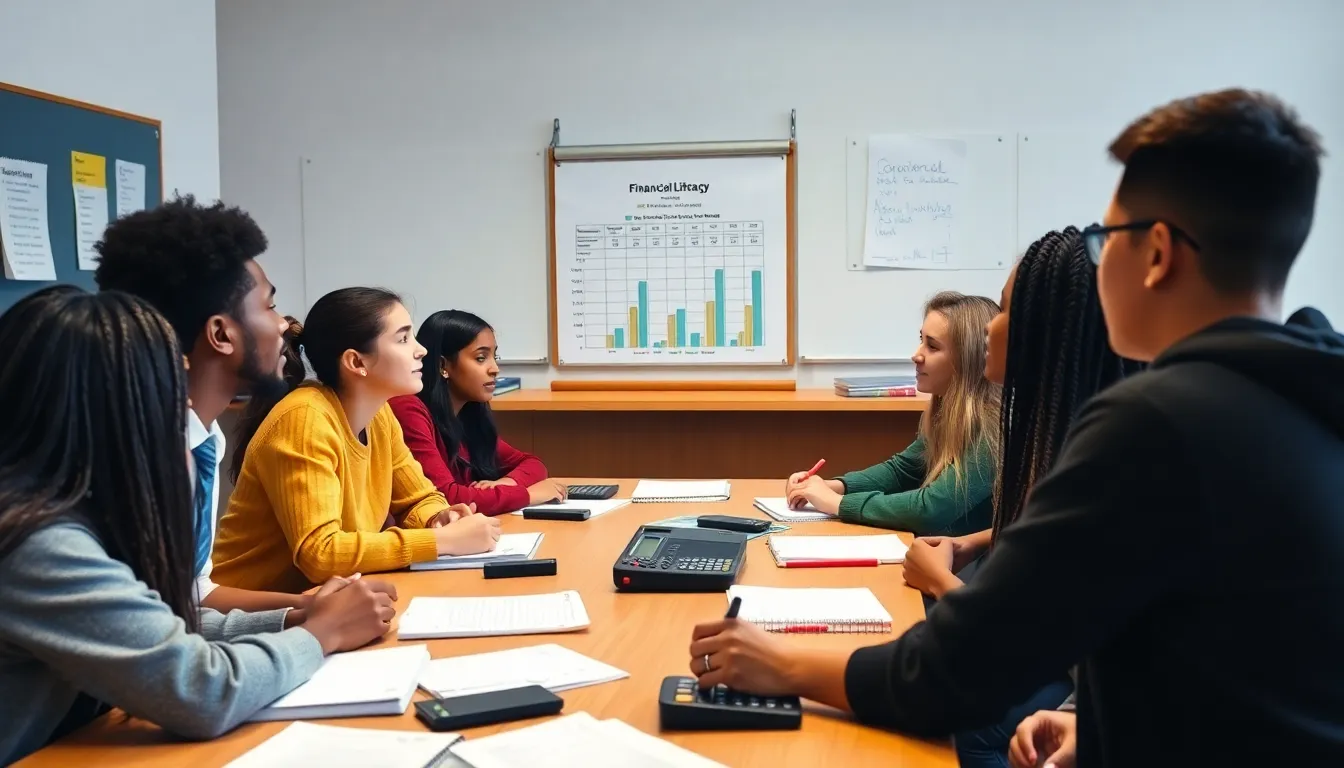Table of Contents
ToggleImagine navigating the wild world of high school armed with nothing but a lunchbox and a dream. Now throw in the responsibility of managing money, and things can get a bit hairy. Personal finance in high school isn’t just about learning to balance a checkbook; it’s about equipping students with the skills to conquer their financial futures.
Understanding Personal Finance
Personal finance encompasses various skills essential for managing money effectively. High school students benefit from learning budgeting, saving, and investing strategies. Financial literacy empowers individuals to make informed decisions about their finances.
Students must grasp the concept of budgeting. Creating and sticking to a budget helps in tracking income and expenses. Savings also play a crucial role in financial health. Building an emergency fund protects against unexpected expenses and provides a safety net.
Investing fundamentals should be part of personal finance education. Understanding the stock market, bonds, and mutual funds equips students with knowledge to grow their wealth. These skills not only foster financial independence but also encourage smart money management practices.
Credit management is another vital aspect. Knowing how to maintain a good credit score affects future borrowing opportunities, whether for college loans or car financing. Awareness of interest rates and credit card terms enables students to avoid common pitfalls.
Risk assessment is important in personal finance decisions. Evaluating risks helps individuals determine the potential impacts on their financial goals. This skill aids in making sound investments or purchasing insurance.
Retirement planning should not be overlooked. Even at a young age, students should understand the importance of saving for retirement. Utilizing accounts like IRAs and 401(k)s lays the foundation for long-term financial stability.
By integrating these components into personal finance education, high schools prepare students for a secure financial future. Acquiring these skills early on enhances their ability to handle financial challenges confidently.
Importance of Learning Personal Finance in High School

Learning personal finance in high school is essential for students. Financial literacy equips them with the necessary skills to navigate real-world money situations.
Building Financial Literacy Early
Developing financial literacy early creates a strong foundation for students. Exposure to budgeting from a young age allows them to understand income and expenses clearly. Creating and adhering to budgets fosters responsible spending habits. Understanding savings concepts prepares students for future financial emergencies. Establishing good financial practices ensures they can make informed decisions throughout life.
Skills Gained Through Personal Finance Education
Various skills emerge through personal finance education. Students learn how to budget effectively, which helps them manage their resources well. They develop saving habits that contribute to financial security. Investing basics introduce students to asset growth strategies, enhancing wealth over time. Knowledge of credit management is crucial for securing loans or credit cards effectively. Learning these skills cultivates a responsible approach to money management, empowering students for a successful financial future.
Key Topics in High School Personal Finance
High school personal finance education covers essential topics that equip students for effective money management. Students gain valuable insights into managing their finances and making informed decisions.
Budgeting Basics
Budgeting serves as a foundational skill in personal finance. Creating a budget allows students to track their income and expenses, helping them allocate funds efficiently. Sticking to a budget fosters discipline, ensuring students prioritize their spending. Using budgeting tools and apps can streamline this process, making it easier to monitor financial progress. Moreover, understanding the difference between needs and wants plays a critical role in effective budgeting.
Understanding Credit and Loans
A solid grasp of credit and loans empowers students for future financial decisions. Learning about credit scores and their impact on borrowing helps students understand the importance of maintaining good credit. Credit cards can offer convenience but come with responsibilities to avoid debt. Students explore different types of loans, such as student and auto loans, highlighting key factors like interest rates and repayment plans. Knowledge in this area helps them navigate borrowing responsibly.
Saving and Investing
Saving and investing form crucial components of financial health. Establishing an emergency fund allows students to prepare for unexpected expenses, providing a financial safety net. Investment basics, such as stocks and mutual funds, encourage students to think about long-term wealth growth. Knowing the benefits of compound interest amplifies the importance of starting to save early. Students learn to set financial goals, reinforcing the need for strategic saving and investing habits that support their aspirations.
Resources for Learning Personal Finance
Various resources exist to help high school students learn personal finance. Online tools and workshops provide effective ways to build financial literacy.
Online Tools and Apps
Numerous apps and websites offer budgeting tools that make financial tracking easier. Examples include Mint and YNAB, both of which help users set budgets and monitor expenses. Financial calculators also aid in understanding savings growth and loan payments. Additionally, investment simulators like Investopedia allow students to practice investing without financial risk. By utilizing these resources, students can manage money confidently and develop lifelong financial skills.
Courses and Workshops
High schools often provide personal finance courses that cover essential topics. These courses typically incorporate lessons on budgeting, saving, and credit management. Workshops led by financial experts also benefit students by offering real-world insights. Online platforms such as Khan Academy and Coursera feature courses on finance that cater to various learning styles. Engaging in these educational opportunities equips students with important financial knowledge for their futures.
Personal finance education in high school is crucial for fostering financial literacy among students. By equipping them with essential skills like budgeting saving and investing they gain the confidence to make informed financial decisions. This foundation not only prepares them for immediate financial responsibilities but also sets the stage for long-term financial success.
As students learn to navigate the complexities of money management they become better prepared to face future challenges. The resources available today make it easier than ever for high schoolers to engage with personal finance. Investing in their financial education today ensures a more secure and prosperous tomorrow.




